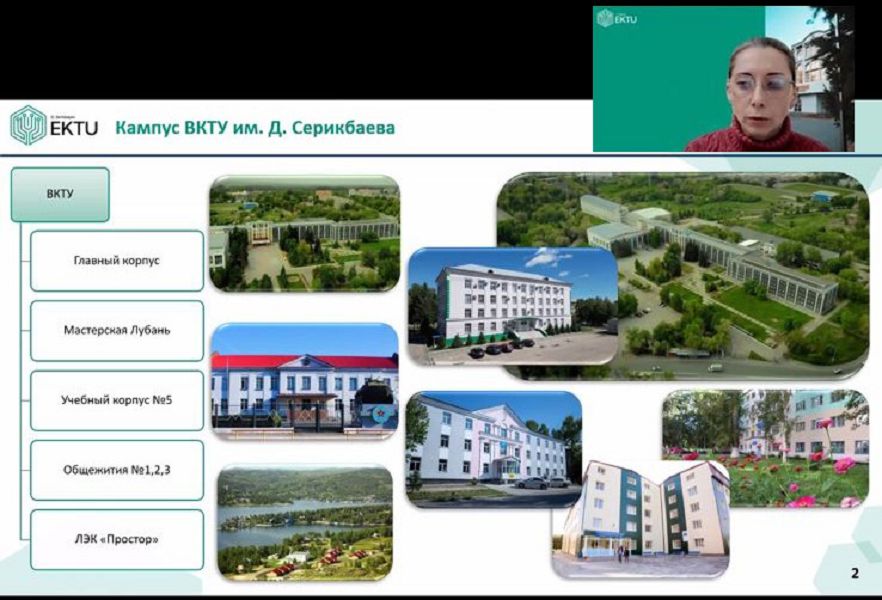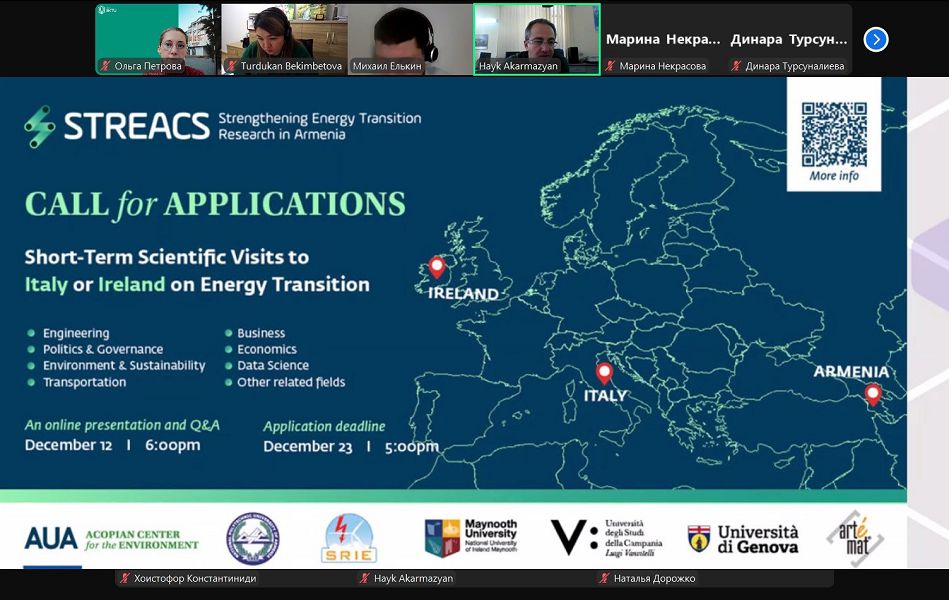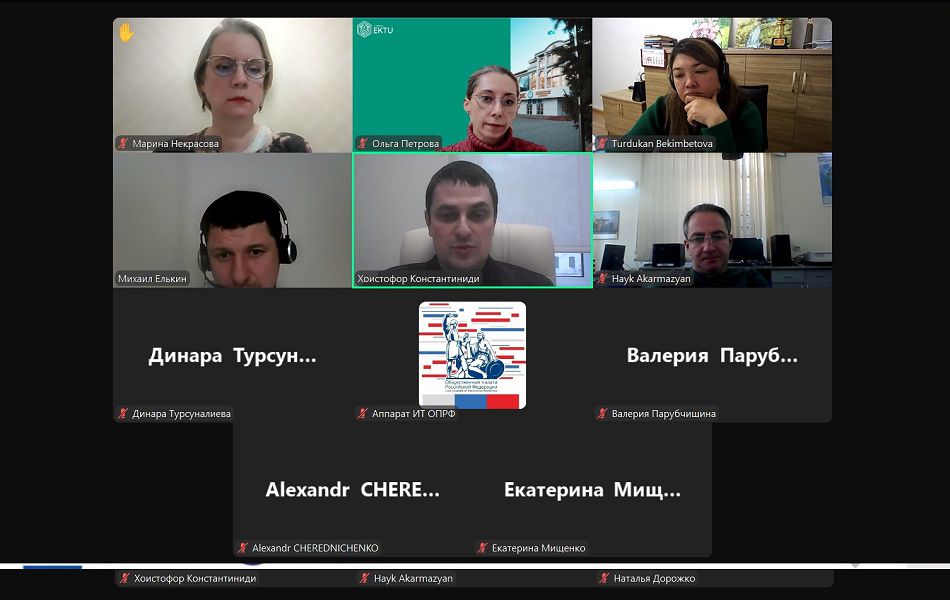On Tuesday, December 10, 2024, an international roundtable "The role of CIS universities in combating climate change" was held on the Zoom platform. Olga Petrova, head of the Green Campus project, and Valeria Parubchishina, a student of group 22-BJ-1, an activist of the Clover eco-club, took part in the event from D. Serikbayev EKTU. She conducts student scientific work on the study of the problem of carbon neutrality.
The roundtable was organized by the Commission of the Public Chamber of the Russian Federation for the Development of Higher Education and Science and the autonomous non-profit organization Academy 2030.
The meeting was moderated by Yuri Sedin, Executive Secretary of the Commission for the Development of Science and Higher Education of the Public Chamber of the Russian Federation, and Mikhail Yelkin, Director of the Academy 2030.
2024 жылғы 10 желтоқсан сейсенбіде Zoom платформасында "ТМД университеттерінің климаттың өзгеруіне қарсы күрестегі рөлі" атты халықаралық дөңгелек үстел өтті. Д. Серікбаев атындағы ШҚТУ атынан іс-шараға Петрова Ольга Анатольевна, Green Campus жобасының жетекшісі және Парубчишина Валерия Олеговна, 22-БЖ-1 тобының студенті, "Клевер"экоклубының белсендісі қатысты. Ол көміртекті бейтараптық мәселесін зерттеу бойынша студенттердің ғылыми жұмысын жүргізеді.
Дөңгелек үстелді Ресей Федерациясының Жоғары білім мен ғылымды дамыту жөніндегі қоғамдық палатасының комиссиясы және "Академия 2030" дербес коммерциялық емес ұйымы ұйымдастырды.
Кездесудің модераторлары Ресей Федерациясы қоғамдық палатасының ғылым мен жоғары білімді дамыту жөніндегі комиссиясының жауапты хатшысы Юрий Валентинович Съедин және "Академия 2030" директоры Михаил Александрович Елькин болды.
Дөңгелек үстел Еуразиялық экономикалық одақ елдерінің қоғамдық палатасының қолдауымен өтті.
Спикерлер ретінде Қырғыз экономикалық университетінің оқу және әдістемелік жұмыс жөніндегі проректоры шақырылды. М. Рысқұлбекова Турсуналиева Динара Мұхтарқызы, Ала-Тоо халықаралық университетінің (AIU) менеджмент факультетінің деканы Бекимбетова Турдукан Суюналиқызы, ЕАЭО Қоғамдық палатасының экология және тұрақты даму модельдері комитетінің төрағасы Некрасова Марина Александровна, Петрова Ольга Анатольевна, Д. Серікбаев атындағы ШҚТУ Green Campus жобасының жетекшісі, БҰҰ-ның Климаттың өзгеруі туралы негіздемелік конвенциясы және Киото хаттамасы бойынша Қазақстан Республикасының Ұлттық сарапшысы, Әл-Фараби атындағы ҚазҰУ университетінің профессоры Чередниченко Александр Владимирович, Армения ұлттық политехникалық университетінің Химиялық технология, экология және еңбекті қорғау кафедрасының меңгерушісі Акармазян Айк Саакович, ММУ экономика факультетінің Тұрақты дамуды басқару орталығының басшысы, РҒА сарапшысы Константиниди Кристофор Александрович.
Кездесуге қатысушылар университеттердің Климаттық стратегияларды құру үшін қолданатын әдістерін, сондай-ақ университеттерді осындай стратегияларды әзірлеуге ынталандыратын ішкі және сыртқы факторларды талдады. Климаттық бастамалардың негізінде жатқан халықаралық стандарттар, ұсыныстар және жергілікті тәжірибе қарастырылды. Сарапшылар Еуразиялық өңір елдері университеттерінің Климаттық стратегияларды құрудағы рөлін зерттеді, тәжірибе және әдістермен алмасты, жоғары оқу орындарының уәждемесін және олардың Климаттық күн тәртібіне қатысуына ықпал ететін сыртқы факторларды анықтады.
Климаттық сын - қатерлер университеттердің алдына жаңа міндет қояды — Климаттық күн тәртібін өз қызметіне біріктіру. Соңғы жылдары Ресей, Орталық Азия және ТМД елдерінің университеттері халықаралық стандарттар мен жергілікті тәжірибеге сүйене отырып, Климаттық стратегияларды белсенді түрде дамыта бастады.
Дөңгелек үстел қарарына біздің университет өкілдерінен келесі тезистер келіп түсті:
- Университеттерге Климаттық күн тәртібін олардың қызметіне біріктіру үшін климаттың өзгеруіне қарсы стратегиялар туралы көбірек жүйелі ақпарат беру;
- Климаттық саясатқа, климаттың өзгеруіне және тұрақтылыққа бағытталған университет қызметкерлеріне арналған шағын оқу курстары мен білім беру модульдерін ұсыну;
- Жоғары оқу орындарында тәжірибе алмасу және климаттық стратегияларды ілгерілету үшін климаттық саясат саласындағы сарапшылармен және ұйымдармен ынтымақтастық;
- ТМД елдеріндегі ірі ғылыми, білім беру және әкімшілік жасыл жобалардың (Ресейдің жасыл университеттері, карбон полигондар және басқалар) тәжірибесін кеңейту.
- Студенттерді климаттың өзгеруі мәселелері бойынша ғылыми және білім беру қызметіне тарту үшін көбірек диалог алаңдарын ұйымдастыру.
Дөңгелек үстел университеттердің Климаттық стратегияларды құру және жүзеге асыру тәсілдерін талқылауға, табысты тәжірибелер мен ұсыныстармен алмасуға арналған алаңға айналды.




